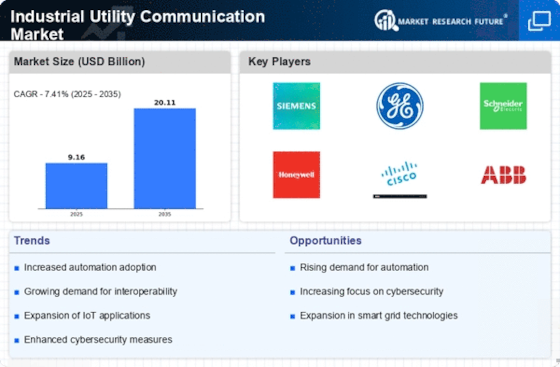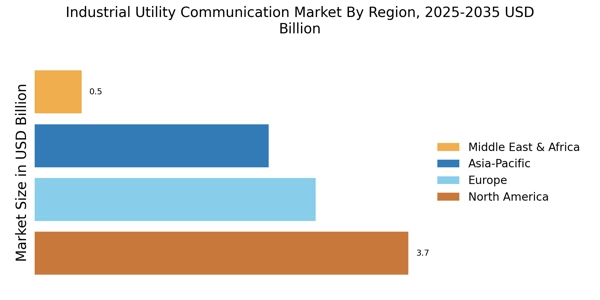Rising Demand for Smart Grids
The Industrial Utility Communication Market is experiencing a notable surge in demand for smart grid technologies. This trend is driven by the need for enhanced efficiency and reliability in energy distribution. Smart grids facilitate real-time communication between utilities and consumers, enabling better energy management. According to recent data, investments in smart grid infrastructure are projected to reach approximately 100 billion dollars by 2026. This shift towards smart grids not only optimizes energy consumption but also supports the integration of renewable energy sources, thereby aligning with sustainability goals. As utilities seek to modernize their operations, the Industrial Utility Communication Market stands to benefit significantly from this transition.
Regulatory Compliance and Standards
The Industrial Utility Communication Market is increasingly influenced by stringent regulatory requirements and standards aimed at ensuring safety and reliability in utility operations. Governments and regulatory bodies are implementing frameworks that mandate the adoption of advanced communication technologies. Compliance with these regulations often necessitates significant investments in infrastructure upgrades and technology enhancements. For instance, the implementation of the North American Electric Reliability Corporation (NERC) standards has prompted utilities to adopt more robust communication systems. This regulatory landscape not only drives demand for advanced communication solutions but also fosters innovation within the Industrial Utility Communication Market, as companies strive to meet compliance requirements while enhancing operational efficiency.
Growing Investment in Renewable Energy
The Industrial Utility Communication Market is significantly impacted by the growing investment in renewable energy sources. As countries strive to meet sustainability targets, there is an increasing shift towards integrating renewable energy into existing utility frameworks. This transition necessitates advanced communication systems capable of managing the complexities associated with distributed energy resources. Data suggests that investments in renewable energy infrastructure are expected to exceed 200 billion dollars by 2025. The need for effective communication solutions to facilitate this integration is paramount, thereby driving demand within the Industrial Utility Communication Market. Utilities are increasingly recognizing the importance of robust communication networks to support the efficient operation of renewable energy systems.
Increased Focus on Operational Efficiency
The Industrial Utility Communication Market is witnessing a heightened emphasis on operational efficiency among utility providers. As competition intensifies, utilities are compelled to streamline their operations and reduce costs. Advanced communication technologies play a pivotal role in achieving these objectives by enabling real-time data exchange and analytics. This allows for proactive maintenance, reduced downtime, and improved resource allocation. Market analysis indicates that utilities adopting advanced communication solutions can achieve operational cost reductions of up to 20%. Consequently, the drive for operational efficiency is a significant catalyst for growth within the Industrial Utility Communication Market, as utilities seek to leverage technology for enhanced performance.
Advancements in Communication Technologies
The Industrial Utility Communication Market is benefiting from rapid advancements in communication technologies. Innovations such as 5G, edge computing, and artificial intelligence are transforming the way utilities communicate and operate. These technologies enable faster data transmission, improved connectivity, and enhanced analytics capabilities. As utilities adopt these advanced solutions, they can achieve greater operational agility and responsiveness. Market forecasts indicate that the adoption of 5G technology alone could enhance communication efficiency by up to 50% in utility operations. This technological evolution is a key driver for growth in the Industrial Utility Communication Market, as utilities seek to leverage cutting-edge solutions to improve service delivery and customer satisfaction.


















Leave a Comment